-
 Bitcoin
Bitcoin $106,731.2224
-1.05% -
 Ethereum
Ethereum $2,444.9804
-1.20% -
 Tether USDt
Tether USDt $1.0003
0.01% -
 XRP
XRP $2.1882
0.09% -
 BNB
BNB $651.1435
-0.61% -
 Solana
Solana $148.3252
-2.09% -
 USDC
USDC $1.0000
0.01% -
 TRON
TRON $0.2787
0.55% -
 Dogecoin
Dogecoin $0.1598
-3.16% -
 Cardano
Cardano $0.5520
-2.43% -
 Hyperliquid
Hyperliquid $39.0960
-2.64% -
 Bitcoin Cash
Bitcoin Cash $516.9519
2.98% -
 Sui
Sui $2.7011
-2.95% -
 Chainlink
Chainlink $13.0582
-1.71% -
 UNUS SED LEO
UNUS SED LEO $8.9250
-2.53% -
 Stellar
Stellar $0.2359
-0.18% -
 Avalanche
Avalanche $17.3856
-3.73% -
 Toncoin
Toncoin $2.8095
-3.56% -
 Shiba Inu
Shiba Inu $0.0...01121
-1.95% -
 Litecoin
Litecoin $85.2795
-0.85% -
 Hedera
Hedera $0.1471
-2.15% -
 Monero
Monero $319.8004
1.12% -
 Dai
Dai $1.0001
0.01% -
 Ethena USDe
Ethena USDe $1.0001
0.02% -
 Bitget Token
Bitget Token $4.5344
-1.07% -
 Polkadot
Polkadot $3.3224
-2.96% -
 Uniswap
Uniswap $6.9697
-2.75% -
 Aave
Aave $266.1658
-2.25% -
 Pepe
Pepe $0.0...09414
-3.41% -
 Pi
Pi $0.4913
-3.29%
Is public key encryption absolutely secure?
Public key encryption, though strong, isn't unbreakable; its security relies on computationally hard problems vulnerable to advances in computing, quantum computing, and cryptanalysis, necessitating robust key management and secure implementation to mitigate risks.
Mar 14, 2025 at 05:26 pm
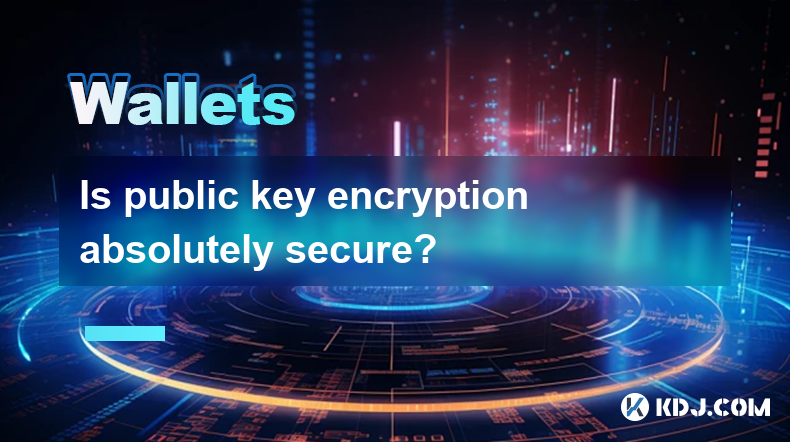
Key Points:
- Public key encryption, while incredibly strong, isn't absolutely secure. Its security relies on the computational difficulty of certain mathematical problems.
- Advances in computing power, quantum computing, and cryptanalysis constantly pose threats to the security of public key algorithms.
- Proper key management and implementation are crucial for maximizing the security of public key encryption in cryptocurrency.
- Weaknesses can be exploited through various attacks, including side-channel attacks and implementation flaws.
Is Public Key Encryption Absolutely Secure?
The question of whether public key encryption (PKE) is absolutely secure is a complex one. The answer, unfortunately, is no. While PKE provides a remarkably high level of security, it's not impenetrable. Its security fundamentally rests on the computational difficulty of solving certain mathematical problems. If these problems become computationally feasible, the entire system crumbles.
Public key cryptography, the foundation of many cryptocurrencies, relies on the asymmetry between a public key and a private key. The public key can be widely distributed, used for encrypting messages or verifying signatures, while the private key must remain strictly confidential. The security depends on the difficulty of deriving the private key from the public key. Algorithms like RSA and ECC rely on this principle.
However, the difficulty is relative. What is computationally infeasible today might become feasible tomorrow with advancements in technology. For example, the development of quantum computers poses a significant threat to currently used PKE algorithms. Quantum computers, with their vastly superior processing power, could potentially break the underlying mathematical assumptions of RSA and ECC, rendering them insecure.
Another crucial aspect is the implementation of PKE. Even with strong algorithms, flaws in the implementation can lead to vulnerabilities. Side-channel attacks, for example, can exploit information leaked during the cryptographic operations, like timing differences or power consumption patterns, to deduce the private key. This means that even with perfect algorithms, poor implementation can compromise the security.
Proper key management is also paramount. If a private key is compromised through negligence, theft, or malware, the security of the entire system is breached. This emphasizes the need for robust security practices, including strong password policies, secure key storage solutions (hardware security modules, or HSMs), and regular key rotation.
The security of PKE is also affected by the ongoing development of cryptanalysis techniques. Researchers are constantly working to find weaknesses in existing algorithms, and new attacks are discovered periodically. This constant arms race between cryptographers developing new algorithms and cryptanalysts breaking them is a defining feature of the field. This highlights the dynamic nature of cryptographic security.
Furthermore, the strength of public key encryption is tied to the key size. Longer keys generally provide stronger security, as they increase the computational difficulty for attackers. However, larger keys also mean slower processing times, creating a trade-off between security and performance. Choosing the appropriate key size is a critical consideration in any application of PKE.
The reliance on random number generators (RNGs) is another potential point of failure. If the RNG used to generate keys is flawed or predictable, the security of the entire system can be compromised. Cryptographically secure random number generators (CSPRNGs) are essential for generating truly unpredictable keys.
The use of digital signatures, based on public key cryptography, is vital for verifying the authenticity and integrity of transactions in cryptocurrencies. If the underlying public key infrastructure (PKI) is weak or compromised, the integrity of the entire system is at risk. Therefore, a robust and secure PKI is a fundamental requirement for secure cryptocurrency transactions.
Public key encryption, while not absolutely secure, remains a cornerstone of modern cryptography and cryptocurrency security. Its strength lies in the complexity of the underlying mathematical problems and the difficulty of breaking them. However, it's essential to understand that ongoing advancements in computing technology and cryptanalysis continually challenge its security, necessitating vigilance and adaptation.
Frequently Asked Questions:
Q: What are the most common threats to public key encryption in cryptocurrencies?
A: The most common threats include quantum computing advancements, implementation flaws, side-channel attacks, compromised private keys, and weaknesses in the random number generators used for key generation.
Q: How can I improve the security of my public key encryption implementation?
A: Employ robust key management practices, utilize strong, well-tested cryptographic libraries, implement appropriate countermeasures against side-channel attacks, and regularly update your software to patch vulnerabilities. Consider using hardware security modules (HSMs) for enhanced key protection.
Q: What is the impact of quantum computing on public key encryption?
A: Quantum computers have the potential to break many widely used public-key algorithms like RSA and ECC, necessitating the development and adoption of quantum-resistant cryptographic algorithms.
Q: Are there alternative cryptographic techniques that are more secure than public key encryption?
A: While no cryptographic technique offers absolute security, post-quantum cryptography is an active area of research, exploring algorithms resistant to attacks from quantum computers. Symmetric-key cryptography also offers strong security, but requires secure key exchange mechanisms.
Q: What role does key length play in the security of public key encryption?
A: Longer key lengths generally increase the computational difficulty for attackers, thus improving security. However, longer keys also lead to increased computational overhead. The choice of key length involves a trade-off between security and performance.
Disclaimer:info@kdj.com
The information provided is not trading advice. kdj.com does not assume any responsibility for any investments made based on the information provided in this article. Cryptocurrencies are highly volatile and it is highly recommended that you invest with caution after thorough research!
If you believe that the content used on this website infringes your copyright, please contact us immediately (info@kdj.com) and we will delete it promptly.
- Cold Wallet, Token, Gains: Is CWT the Smartest Crypto Move?
- 2025-07-02 01:10:12
- Pi Coin's Rocky Ride: Support Levels, Recovery Timeline, and What the Experts Are Saying
- 2025-07-02 01:10:12
- Shiba Inu, Ozak AI, and Cryptocurrency: Navigating the Meme Coin Maze
- 2025-07-02 01:15:12
- Solana Meme Coin Mania: Trading Bots Take Center Stage
- 2025-07-02 01:15:12
- UniCredit, Bitcoin, and BlackRock ETF: A New Era of Crypto Investment?
- 2025-07-02 00:30:12
- UniCredit, Bitcoin ETF, and BlackRock: A New York Minute on Crypto's Big Players
- 2025-07-02 00:30:12
Related knowledge
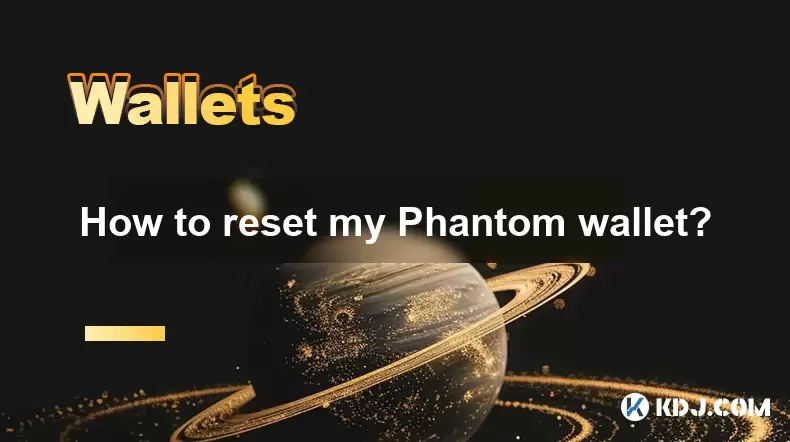
How to reset my Phantom wallet?
Jul 02,2025 at 12:36am
Understanding the Need for Resetting Your Phantom WalletIf you're using a Phantom wallet, you may encounter situations where resetting your wallet becomes necessary. This could be due to forgotten passwords, seed phrase issues, or account corruption. Phantom is a non-custodial wallet primarily used for interacting with the Solana blockchain, and it stor...
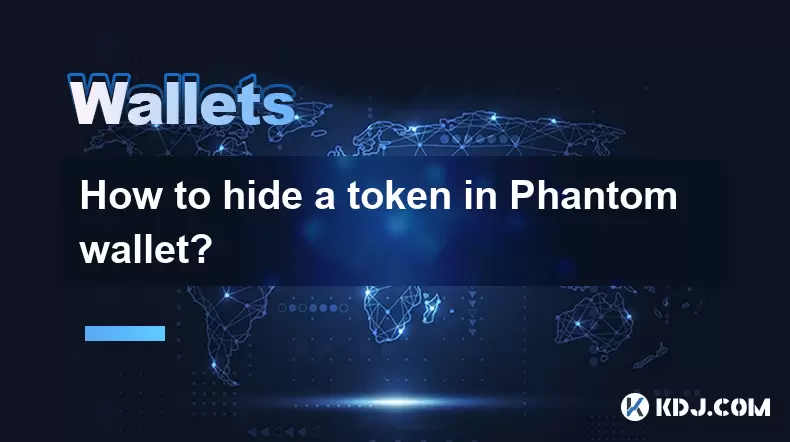
How to hide a token in Phantom wallet?
Jul 01,2025 at 05:49pm
Understanding the Phantom Wallet InterfacePhantom wallet is a popular non-custodial wallet used primarily for interacting with the Solana blockchain. It allows users to store, send, receive, and manage various tokens, including both fungible and non-fungible tokens (NFTs). Before attempting to hide a token, it's essential to understand how the wallet in...
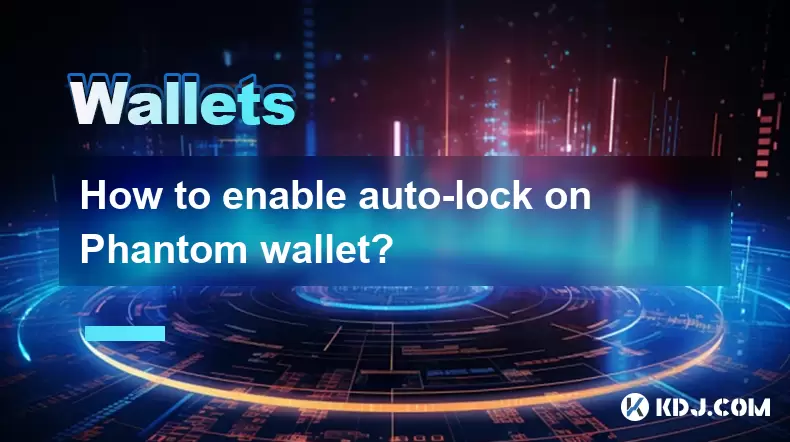
How to enable auto-lock on Phantom wallet?
Jul 01,2025 at 04:01pm
What is Auto-Lock in Phantom Wallet?Phantom wallet is a popular non-custodial cryptocurrency wallet used primarily for interacting with the Solana blockchain. One of its security features includes the ability to set an auto-lock timer, which ensures that the wallet locks itself automatically after a period of inactivity. Auto-lock enhances security by p...
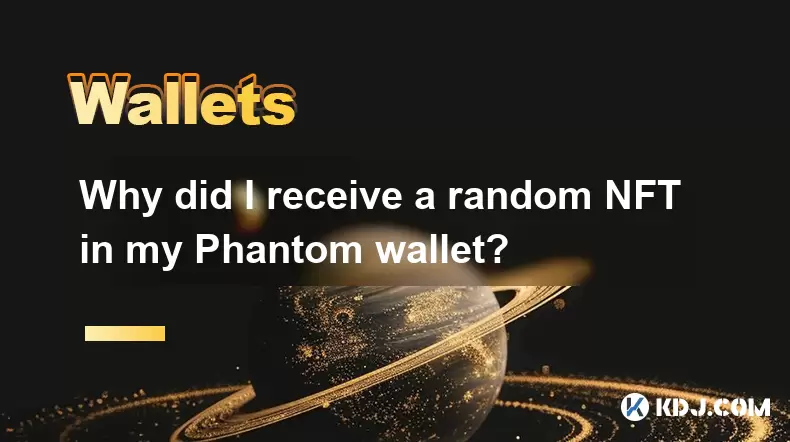
Why did I receive a random NFT in my Phantom wallet?
Jul 01,2025 at 09:00pm
Receiving an Unexpected NFT in Your Phantom WalletIf you've recently opened your Phantom wallet and noticed an unfamiliar NFT appearing in your collection, you're not alone. Many users have reported receiving random or unsolicited non-fungible tokens, often without any prior interaction with the project or sender. This phenomenon has become increasingly...

How to add Ethereum network to Phantom wallet?
Jul 02,2025 at 02:00am
Understanding Phantom Wallet and Ethereum CompatibilityPhantom wallet is a non-custodial wallet primarily designed for the Solana blockchain. It provides users with secure storage, sending, and receiving of Solana-based tokens and NFTs. However, many users wonder if they can integrate Ethereum-compatible networks into their Phantom wallet. While Phantom...
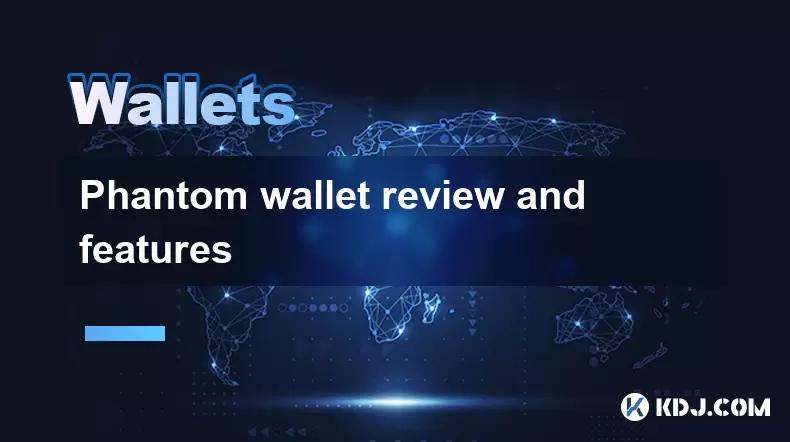
Phantom wallet review and features
Jul 02,2025 at 01:28am
What is Phantom Wallet?Phantom wallet is a non-custodial cryptocurrency wallet specifically designed for the Solana blockchain. It allows users to store, send, receive, and interact with decentralized applications (dApps) on the Solana network seamlessly. Unlike traditional wallets that may require intermediaries, Phantom ensures complete control remain...

How to reset my Phantom wallet?
Jul 02,2025 at 12:36am
Understanding the Need for Resetting Your Phantom WalletIf you're using a Phantom wallet, you may encounter situations where resetting your wallet becomes necessary. This could be due to forgotten passwords, seed phrase issues, or account corruption. Phantom is a non-custodial wallet primarily used for interacting with the Solana blockchain, and it stor...

How to hide a token in Phantom wallet?
Jul 01,2025 at 05:49pm
Understanding the Phantom Wallet InterfacePhantom wallet is a popular non-custodial wallet used primarily for interacting with the Solana blockchain. It allows users to store, send, receive, and manage various tokens, including both fungible and non-fungible tokens (NFTs). Before attempting to hide a token, it's essential to understand how the wallet in...

How to enable auto-lock on Phantom wallet?
Jul 01,2025 at 04:01pm
What is Auto-Lock in Phantom Wallet?Phantom wallet is a popular non-custodial cryptocurrency wallet used primarily for interacting with the Solana blockchain. One of its security features includes the ability to set an auto-lock timer, which ensures that the wallet locks itself automatically after a period of inactivity. Auto-lock enhances security by p...

Why did I receive a random NFT in my Phantom wallet?
Jul 01,2025 at 09:00pm
Receiving an Unexpected NFT in Your Phantom WalletIf you've recently opened your Phantom wallet and noticed an unfamiliar NFT appearing in your collection, you're not alone. Many users have reported receiving random or unsolicited non-fungible tokens, often without any prior interaction with the project or sender. This phenomenon has become increasingly...

How to add Ethereum network to Phantom wallet?
Jul 02,2025 at 02:00am
Understanding Phantom Wallet and Ethereum CompatibilityPhantom wallet is a non-custodial wallet primarily designed for the Solana blockchain. It provides users with secure storage, sending, and receiving of Solana-based tokens and NFTs. However, many users wonder if they can integrate Ethereum-compatible networks into their Phantom wallet. While Phantom...

Phantom wallet review and features
Jul 02,2025 at 01:28am
What is Phantom Wallet?Phantom wallet is a non-custodial cryptocurrency wallet specifically designed for the Solana blockchain. It allows users to store, send, receive, and interact with decentralized applications (dApps) on the Solana network seamlessly. Unlike traditional wallets that may require intermediaries, Phantom ensures complete control remain...
See all articles

























































































